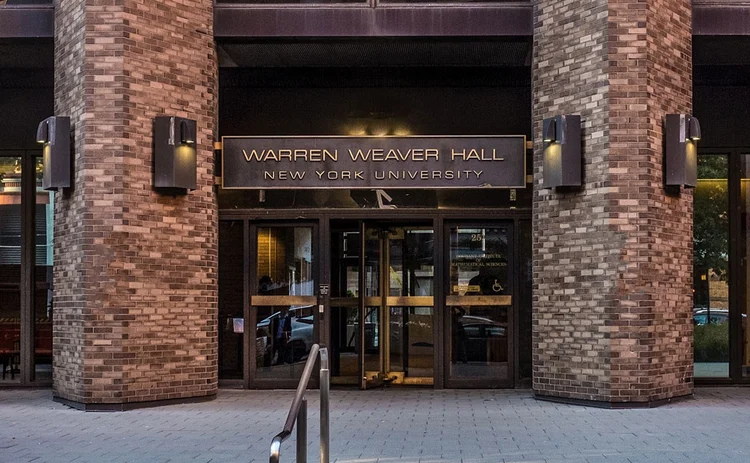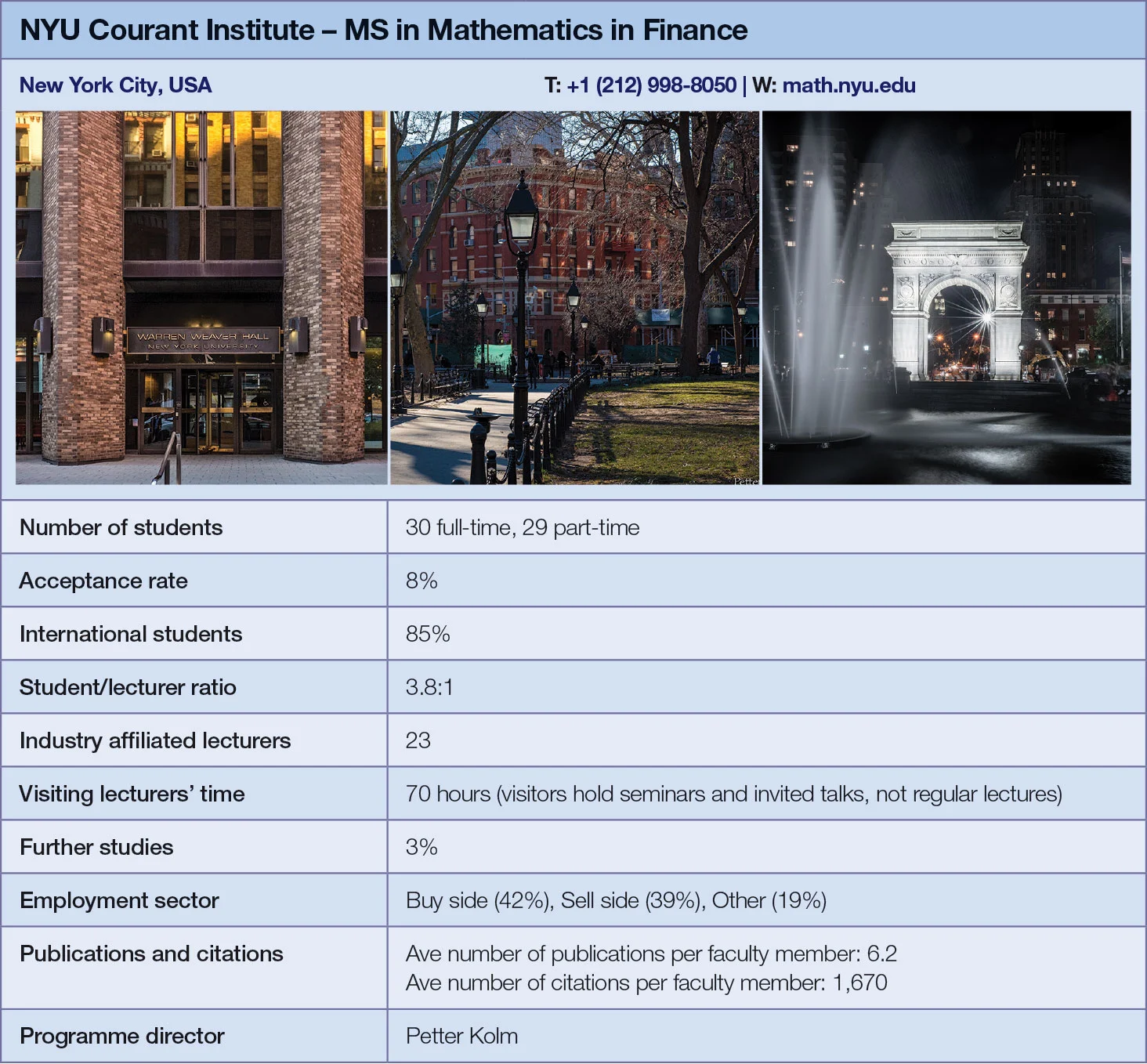
Quant Guide 2017: NYU Courant Institute
New York City, USA

MS in Mathematics in Finance | metrics table at end of article
In 2018, the master’s in mathematics in finance offered by New York University’s Courant Institute of Mathematical Sciences will celebrate its twentieth anniversary, making it one of the oldest dedicated programmes of its kind.
The full-time programme runs for three semesters, and has a strong emphasis on practical application of skills learned during study. Part-time study is also an option. According to Petter Kolm, its director, it squarely targets individuals who wish to pursue a career in the financial industry.
Students are required to take four courses each semester, as well as completing a summer internship. Every enrolee must then come back to complete the final semester and submit a master’s thesis, supervised by an industry adviser.
The core modules include derivative securities, risk and portfolio management with econometrics, stochastic calculus, computing in finance and more. In addition, students can choose from around 20 electives, which include courses on market microstructure, algorithmic trading and quantitative strategies, securitised products and structured finance.
“We try to keep our electives to a smaller number, rather than constantly adding new courses. We keep electives focused on the skills that companies are looking for. We stay on top of that content by talking to industry practitioners, who teach the majority of electives,” says Kolm.
The content of every course is reviewed annually to ensure that the programme keeps abreast of developments in quantitative finance.
“We see ourselves as one of the first movers when it comes to changes,” says Kolm. “We often hear about trends first from our involvement in industry. Being in the midst of New York, a couple of subway stops away from Wall Street, makes it very easy for us; we’re very lucky.”
In recent years, the programme has been adjusted to include new courses on regulation and regulatory risk models, derivatives in energy markets, and advanced topics in equity derivatives.

“After the crisis, with the new regulatory framework in the US, a big part of what quants do today, especially on the sell side, is building models that satisfy regulatory requirements. The regulation course is not for lawyers or attorneys; a big part of it is to learn models that are supporting the new regulatory framework, for example, CCAR [the Federal Reserve’s Comprehensive Capital Analysis and Review stress tests],” says Kolm.
In the third quarter of this year, the programme will start offering a brand new course on data science and quantitative finance, which will be co-taught by Kolm and an industry practitioner.
The programme also focuses on equipping students with versatile programming skills, allowing them to get to grips with the various programming languages they will encounter in the workplace – but the emphasis is less on learning by rote, and more on understanding the moving parts. According to Kolm, this is something financial services employers are particularly keen on.
“Exactly what language you know is less important. When it comes to modelling languages, people want to see quick results: if you can use MatLab or even an Excel spreadsheet to quickly answer a question, that’s a highly desirable skill to have,” says Kolm.
At present, the programme teaches Java, C++, Python, R and MatLab.
Graduates say this approach has stood them in good stead for the world of work. Kelsey Letang graduated from the programme in January 2013, and worked as a desk quant for the credit arbitrage proprietary trading desk at Societe Generale.
“I felt well-prepared thanks to the courses on derivatives and programming. While our programming course formally taught Java, many courses required homework to be completed in VBA, MatLab and R. In the years since graduating, I have used all these programming languages and have felt well equipped,” says Letang, who currently works as a researcher at London-based hedge fund GSA Capital.
Students often participate in competitions, such as the Rotman International Trading Competition in Toronto and with the International Association of Quantitative Finance.
“The advice I give when it comes to competitions is: if you see you have time to do it, it’s a great experience to have. If you win a competition, you will get a lot of recognition, but if you don’t, it’s a great learning experience and another great thing you can talk about when you go for an interview,” says Kolm.

Click here for links to the other universities and an explanation of how to read the metrics tables
Only users who have a paid subscription or are part of a corporate subscription are able to print or copy content.
To access these options, along with all other subscription benefits, please contact info@risk.net or view our subscription options here: http://subscriptions.risk.net/subscribe
You are currently unable to print this content. Please contact info@risk.net to find out more.
You are currently unable to copy this content. Please contact info@risk.net to find out more.
Copyright Infopro Digital Limited. All rights reserved.
As outlined in our terms and conditions, https://www.infopro-digital.com/terms-and-conditions/subscriptions/ (point 2.4), printing is limited to a single copy.
If you would like to purchase additional rights please email info@risk.net
Copyright Infopro Digital Limited. All rights reserved.
You may share this content using our article tools. As outlined in our terms and conditions, https://www.infopro-digital.com/terms-and-conditions/subscriptions/ (clause 2.4), an Authorised User may only make one copy of the materials for their own personal use. You must also comply with the restrictions in clause 2.5.
If you would like to purchase additional rights please email info@risk.net
More on Quantitative finance
Quant Finance Master’s Guide 2026
Risk.net’s guide to the world’s leading quant master’s programmes, with the top 25 schools ranked
Baruch, Princeton cement duopoly in 2026 Quant Master’s Guide
Columbia jumps to third place, ETH-UZH tops European rivals
Quant Finance Master’s Guide 2025
Risk.net’s guide to the world’s leading quant master’s programmes, with the top 25 schools ranked
Baruch maintains top spot in 2025 Quant Master’s Guide
Sorbonne reclaims top spot among European schools, even as US salaries decouple
Quant Finance Master’s Guide 2023
Risk.net’s guide to the world’s leading quant master’s programmes, with the top 25 schools ranked
Baruch topples Princeton in Risk.net’s quant master’s rankings
US schools cement top five dominance as graduate salaries soar
Is it worth doing a quant master’s degree?
UBS’s Gordon Lee – veteran quant and grad student supervisor – asks the hard question
Starting salaries jump for top quant grads
Quant Guide 2022: Goldman’s move to pay postgrads more is pushing up incomes, says programme director







